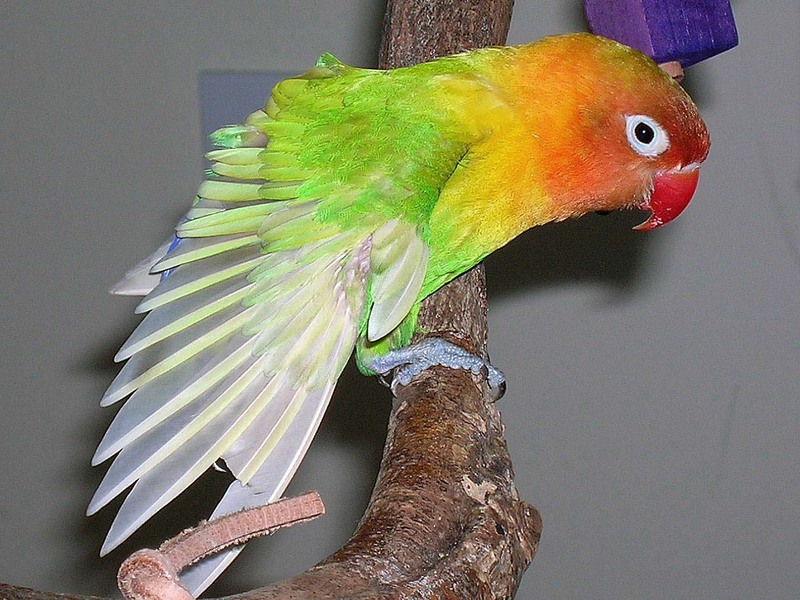Fischer's Lovebird
From Wikipedia, the free encyclopedia
[Photo] Fischer's lovebird, with it's wing spread. Photo by TheAlphaWolf
The Fischer's Lovebird, (Agapornis fischeri), is a species of bird in the parrot family. They were originally discovered in the late 1800s, and were first bred in the United States in 1926. They are named after German explorer Gustav Fischer.
Description
Fischer's lovebirds have green backs, chests, and wings, their necks are a golden yellow and as it progresses upward it becomes darker orange. The top of the head is olive green, and the beak is bright red. The upper surface of the tail has some purple or blue feathers. A. fischeri has a white circle around its eyes. Young birds are very similar to the adults, except for the fact that they are duller and the base of their mandible has brown markings. They are one of the smaller lovebirds, about 14-15 cm in length and 43-58 g weight.
Distribution
Fischers are native to a small area of east-central Africa, south and southeast of Lake Victoria in northern Tanzania. In drought years, some birds move west into Rwanda and Burundi seeking moister conditions.
Behaviour
A. fischeri lives at elevations of 1,100-2,200 m in small flocks. They have a fast, straight flight, and the sound of their wings as they fly can be heard. They live in isolated clumps of trees with grass plains between them. They also have a high-pitched chirp, and are very noisy. These birds eat a wide variety of foods, including seeds and fruit. They sometimes are pests to farmers, as they eat their crops such as maize and millet. The breeding season is January through April and June through July. The nest is in a hole in a tree, often in old woodpecker holes 2-15 m above the ground; the 3-8 eggs are incubated for 23 days, and the chicks fledging in 38 days. The population is estimated to be between 290,000-1,000,000, with low densities outside of protected areas due to capture for the pet trade; export licenses were suspended in 1992 to halt any further decline in the species.
...
http://en.wikipedia.org/wiki/Fischer%27s_Lovebird
| The text in this page is based on the copyrighted Wikipedia article shown in above URL. It is used under the GNU Free Documentation License. You may redistribute it, verbatim or modified, providing that you comply with the terms of the GFDL. |
|

